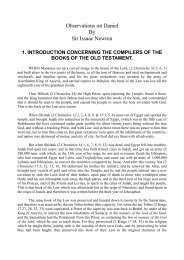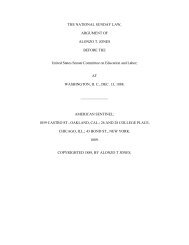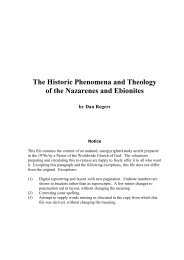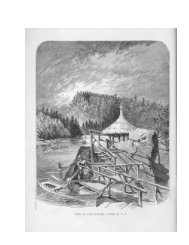by Percy E. Corbett - friendsofsabbath.org
by Percy E. Corbett - friendsofsabbath.org
by Percy E. Corbett - friendsofsabbath.org
Create successful ePaper yourself
Turn your PDF publications into a flip-book with our unique Google optimized e-Paper software.
An extract from the dust sheet of 'ARTHUR' (1) <strong>by</strong> Beram Saklatvala reads:-<br />
35<br />
"This is an exacting documentary study, contemporary in approach, <strong>by</strong> an author who has an<br />
expert knowledge of Roman Britain and its aftermath.<br />
That behind a legendary figure of King Arthur there stands a real person is now generally<br />
agreed. He was the last champion of Roman Britain and the last great commander of the<br />
Romanised Britons in their struggle against the Anglo-Saxon invaders.<br />
He played a vital - and hitherto not realised part in the formation of the character of the British<br />
people. . . . Arthur emerges as an immensely - dominating figure, both triumphant and tragic,<br />
and of a calibre which makes comprehensible his permanent adoption as a national hero <strong>by</strong><br />
the very people he so bitterly fought."<br />
According to the researches of Beram Saklatvala, Arthur championed Christianity. On pages<br />
34 and 35 he refers to the attendance of three British Christian bishops at the Council at Aries<br />
in Gaul in A.D.314. At the same time he refers to the heretics and writes, "It was therefore to<br />
be one of the problems which the predecessors of Arthur, if not Arthur himself, had to face as<br />
they so stoutly defended Britain's ancient and deep-rooted Christian tradition."<br />
On pages 64 and 65 he writes:- "If the Christian faith was to serve as a unifying force it had to<br />
be verified in itself. Rome could no more permit conflicting beliefs within the Christian<br />
community than in earlier days she could permit local army commanders to develop<br />
independent policies. During the fourth and fifth centuries the church was stamping out<br />
heresies and imposing unity of belief.”<br />
Germanus, the recently appointed Bishop of Auxerre in Gaul and formerly a soldier, was sent<br />
<strong>by</strong> the Church in A.D.429 to retrieve the Britons from their flourishing heresy of Pelagius. He<br />
found the Britons living a fairly normal life, governed <strong>by</strong> local kings and their towns at least in<br />
part, maintained. His biography, written about fifty years later, shows that although the Picts<br />
and Scots were raiding and the Saxons had made landings, the situation was still far from<br />
disastrous. Germanus can refer to Britain as 'that most wealthy island.' His visit alone - it was<br />
eighteen years later - shows that communications were still open between the island and Gaul,<br />
and that the British army was not altogether unsuccessful.<br />
During the spring of A.D.429 some of the Picts and Scots renewed their alliance with the<br />
Saxons and were harrying the countryside; the leaders of the British army appealed to<br />
Germanus for help. He gave them both spiritual and military succour. In the camp he built a<br />
temporary wooden church, in which to celebrate Easter and there he baptised such of the<br />
Britons as were not already Christians. He also took personal command of the army."<br />
Germanus trapped the enemy in a valley, concealing his troops in the surrounding steep hills.<br />
When he and his fellow priests gave the pre-arranged signal, a triple shout of 'Alleluia,' the call<br />
was taken up <strong>by</strong> the British army, the barbarians turned and ran and the retreat became a rout.<br />
(1) David & Charles. Newton Abbott.

















